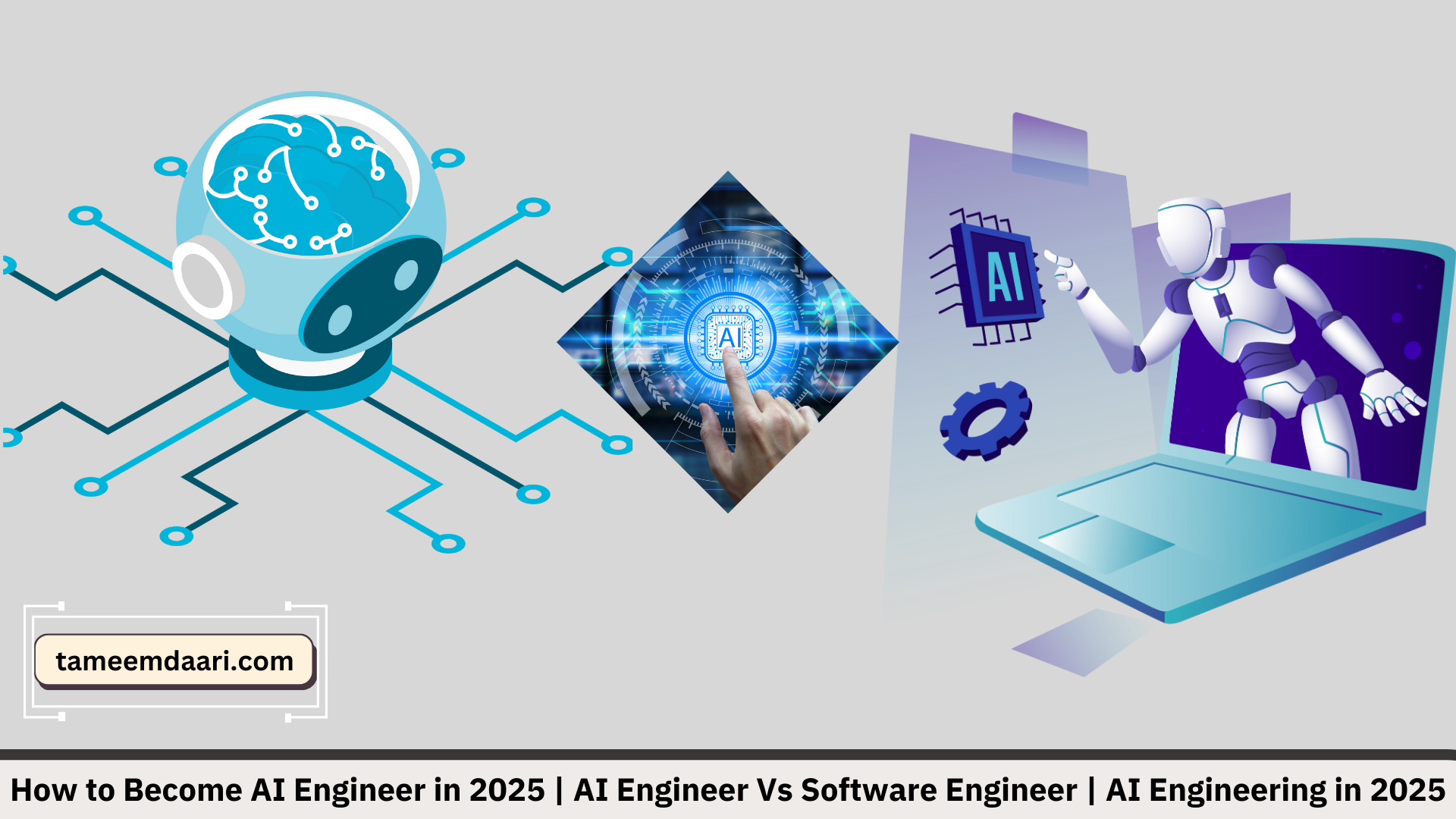By 2025, AI engineering will dominate the tech landscape, with the global AI market projected to exceed $500 billion. How to Become AI Engineer in 2025 | AI Engineer Vs Software Engineer | AI Engineering in 2025. As industries rush to adopt AI, the demand for skilled AI engineers is skyrocketing. But how does this role differ from traditional software engineering? And what steps should you take to enter this high-growth field?
This guide breaks down the How to Become AI Engineer in 2025 | AI Engineer Vs Software Engineer | AI Engineering in 2025 is debate, outlines actionable steps to launch your AI career in 2025, and explores emerging trends shaping the future of AI engineering.
AI Engineer vs Software Engineer: Key Differences
| Factor | AI Engineer | Software Engineer |
|---|---|---|
| Core Focus | Building AI/ML models, optimizing algorithms | Developing software/applications, system architecture |
| Key Skills | Machine Learning, Python, TensorFlow/PyTorch, NLP, Data Science | Java/C++, DevOps, APIs, Cloud Computing, Full-Stack Development |
| Tools & Frameworks | Jupyter Notebooks, Keras, OpenAI Gym | Docker, Kubernetes, Jenkins, React |
| End Goal | Solve complex problems with predictive models | Build scalable, functional software |
| Salary (2025 Projection) | 150K–150K–220K (U.S. average) | 120K–120K–180K (U.S. average) |
What Does an AI Engineer Do in 2025?
AI engineers design, train, and deploy machine learning models to solve real-world problems. Key responsibilities include:
- Data Preparation: Clean, preprocess, and structure datasets for training.
- Model Development: Build neural networks, NLP systems, or computer vision models.
- Deployment: Integrate AI into apps via APIs (e.g., TensorFlow Serving).
- Ethics & Compliance: Ensure AI systems are transparent, unbiased, and GDPR-compliant.
2025 Trends:
- AI Democratization: Low-code platforms (like AutoML) empower non-experts.
- Quantum Machine Learning: Early adoption of quantum computing for complex AI tasks.
- AI Regulation: Governments mandate ethical AI audits and transparency reports.
How to Become an AI Engineer in 2025: 6 Steps
Build a Strong Educational Foundation
- Degrees: Bachelor’s in Computer Science, Data Science, or Mathematics. Master’s in AI/ML preferred for advanced roles.
- Certifications: Google’s TensorFlow Developer Certificate, AWS Certified Machine Learning Specialty.
Master Core Technical Skills
- Programming: Python (NumPy, Pandas), R, SQL.
- ML Frameworks: TensorFlow, PyTorch, Scikit-learn.
- Cloud Platforms: AWS SageMaker, Google AI Platform, Azure ML.
- Math: Linear algebra, calculus, statistics.
Specialize in a Niche
- Computer Vision: Object detection, facial recognition (OpenCV).
- Natural Language Processing (NLP): ChatGPT-style LLMs, sentiment analysis.
- Reinforcement Learning: Robotics, game AI (OpenAI Gym).
Build a Portfolio
- Kaggle Competitions: Showcase problem-solving skills.
- GitHub Projects: Deploy models for real-world use cases (e.g., fraud detection, recommendation engines).
Gain Practical Experience
- Internships: Work at AI startups or tech giants (Google Brain, OpenAI).
- Freelancing: Solve business problems on Upwork or Toptal.
Stay Ahead of 2025 Trends
- Learn MLOps: Automate ML workflows with tools like MLflow.
- Explore Generative AI: Master tools like DALL-E, Stable Diffusion.
- Ethical AI: Study frameworks for bias mitigation (IBM’s AI Fairness 360).
AI Engineer vs Software Engineer: Which Career is Right for You?
Choose AI Engineering If You…
- Love math, statistics, and algorithmic problem-solving.
- Want to work on cutting-edge tech (e.g., autonomous vehicles, AI healthcare).
- Are comfortable with ambiguity and iterative model training.
Choose Software Engineering If You…
- Prefer building tangible products (apps, websites, SaaS platforms).
- Enjoy system design and optimizing code for scalability.
- Seek faster entry into the job market with broader opportunities.
Top Industries Hiring AI Engineers in 2025
- Healthcare: Predictive diagnostics, drug discovery.
- Finance: Fraud detection, algorithmic trading.
- Retail: Personalized recommendations, inventory automation.
- Automotive: Self-driving cars, AI-powered logistics.
- Cybersecurity: Threat detection using AI.
Future of AI Engineering: 2025 and Beyond
- AI-Augmented Development: Tools like GitHub Copilot write 40% of code.
- Edge AI: Deploying lightweight models on IoT devices (e.g., smart cameras).
- Human-AI Collaboration: Engineers focus on creative tasks while AI handles coding.
- Global Talent Demand: 40% of tech job postings will require AI/ML skills (LinkedIn).
Conclusion
AI engineering offers unparalleled growth opportunities in 2025, but it requires continuous learning and adaptability. While software engineering remains a stable, versatile career, AI engineers will lead innovation in fields like quantum computing, generative AI, and ethical machine learning.
To succeed:
- Focus on specialized skills (e.g., NLP, MLOps).
- Build a portfolio that solves real problems.
- Stay updated on AI regulations and emerging tools.
